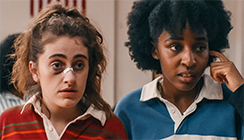|
|
|
|
Bottoms
|
 |
|
Bottoms presents an intriguing genre dissonance/interference. A step-aside from the typical generic mash-up (whatever the blend may be), Seligman – co-writing with her rising actor Rachel Sennott – really serves up something that is a bit disturbing and unmanageable, ineluctably finding itself in a code-break zone that makes reviewers and audiences immediately squeamish. As a result, Bottoms may already be passing into the chilling silence of oblivion (a few scattered exclamations of enthusiasm notwithstanding). It’s worth catching before that freeze-out occurs. The premise is simple, if rather unexpected. PJ (Sennott, overplaying her improv mannerisms somewhat) and Josie (Ayo Edibiri, more controlled) are two queer high school girls who have yet to experience sex. They each have an ideal partner in sight: Isabel (Havana Rose Liu) for PJ, Brittany (Kaia Gerber, daughter of Cindy Crawford) for Josie. They hit, with inspired illogic, on a way to bring a bunch of girls together, and to make themselves somewhat popular and respected: to start a self-defense class. But this class swiftly reveals its true nature, as an adrenalin-pumped ‘fight club’ that perversely feeds physical intimacy through bashing the bloody hell out of one another. But it’s not yet that Fincher/Korine element of gleeful sadomasochism – nor even the wholesale gender-switch involved – that clinches the disquiet-factor of the (cheekily titled) Bottoms. The high school in which everything plays out (Seligman aims for specificity neither in local place nor historical time) is massively structured on a surreal exaggeration: its jock sports stars, particularly Jeff (Nicholas Galitzine), are worshipped as gods, and the culture of violent macho aggression extends itself to a cross-region, before-the-big-game panic in which not only humiliation and obstruction but also murder itself (as testified to by Josie’s ‘lesbian Yoda’ Rhodes [Punkie Johnson]) figures. Here, we are getting closer to the film’s inherent strangeness. (A special note of appreciation must be added for the inspired conception of the off-and-on ‘feminist’ black male teacher played by former footballer Marshawn Lynch.) Standard complications in the plot arise from: a. Josie & PJ’s lies about having killed people while in ‘juvie’ detention, and the jocks doing a background check on that legend; b. the up-and-down vicissitudes of the central friendship (one has a night of satisfaction, the other doesn’t); and c. the role of third-wheel Hazel (Ruby Cruz), essential to the club’s success, and not much recognised for it by the principals. But all of that is basically narrative mechanics (handled more deftly in some cases than others: don’t zone out on the early info about pineapple juice, which becomes crucial), not the palpitating centre of the project. Let’s recap on the multiple tones and templates spinning in the air of Bottoms. It’s a queer friendship/relationship movie, and thus a follow-up in Seligman’s career to her debut, the queer-Jewish-themed Shiva Baby (2020). But the relative naturalism of the latter now finds itself transformed into the cliché-and-stereotype Pop Cinema format of the teen movie. And it’s a bit reserved on that level; it doesn’t launch off into the high-energy zaniness of several girl-teen films it recalls, such as Booksmart (2019) and Good Girls Get High (2018) – although a priceless sequence set to Bonnie Tyler’s “Total Eclipse of the Heart”, complete with interpretive dance gestures from the clueless Jeff, briefly revs things up to the best possible level (Maria Rusche’s cinematography really shines when things get more stylised). I’ve flagged the death and eroticised violence. Yet Bottoms is not a black comedy in the reassuring vein of Heathers (1988) or its many imitations (such as the pale Mean Girls [2004] to which I’ve seen Seligman’s film inaccurately compared) – reassuring in that the level and effect of the violence shown is always carefully coded to a smug, not-real register of dark fantasy. Nor is it a similarly safe teen-horror combo in the well-worn groove of McG’s The Babysitter series (2017 & 2020), McKee/Sivertson’s All Cheerleaders Die (2013), and literally dozens of others including the disappointing Bodies Bodies Bodies (Halina Reijn, 2022) also featuring Sennott. And it’s not full-on camp as in John Waters, either. What Bottoms is, that very few teen movies are, is an action film: all the major show-pieces are fight scenes. But something weird is happening in this blood-and-guts high school: we are used, in the action genre, to the standard indifference (the film’s as well as our own as viewers) to anonymous figures getting blasted, dying, and instantly disappearing from the frame and the plot. That’s all part of the genre’s artifice. In the teen setting, however, such aggregation and elimination of bodies is harder to just flip off. Without giving away the entire story, let me say that Bottoms climaxes in a rousing action scene (its opening slo-mo wide shot is well cued) that includes not just a lot of blood – that’s been featured throughout – but also not a little death, something the film itself appears to acknowledge and joke nervously about. And – I’m being cryptic now for spoiler’s sake – see if you can spot the sword, associated with the film’s most deliriously psychotic thrill-kill character, in the ultimate, full view of the space. I couldn’t. © Adrian Martin 27 November 2023 |
![]()